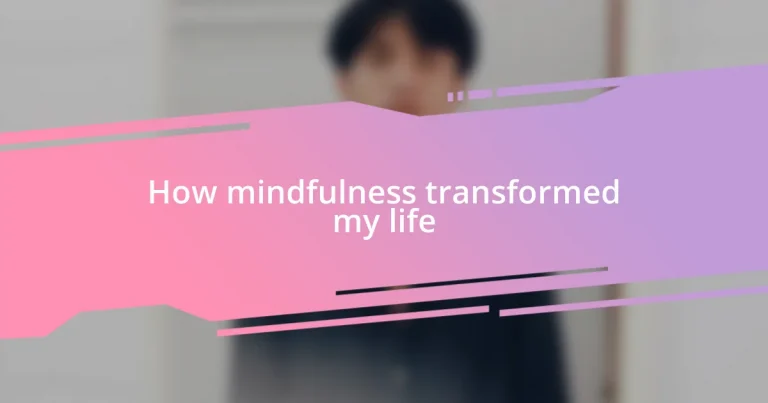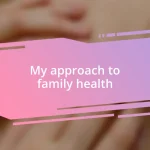Key takeaways:
- Mindfulness enhances awareness and non-judgment, allowing individuals to observe thoughts and emotions without labeling them, leading to a more peaceful existence.
- Practices like meditation, mindful walking, and gratitude journaling contribute to emotional resilience, helping individuals navigate challenges and transform anxiety into clarity.
- Building a supportive mindfulness community fosters shared experiences and accountability, providing encouragement and diverse insights for sustaining lifelong mindfulness habits.
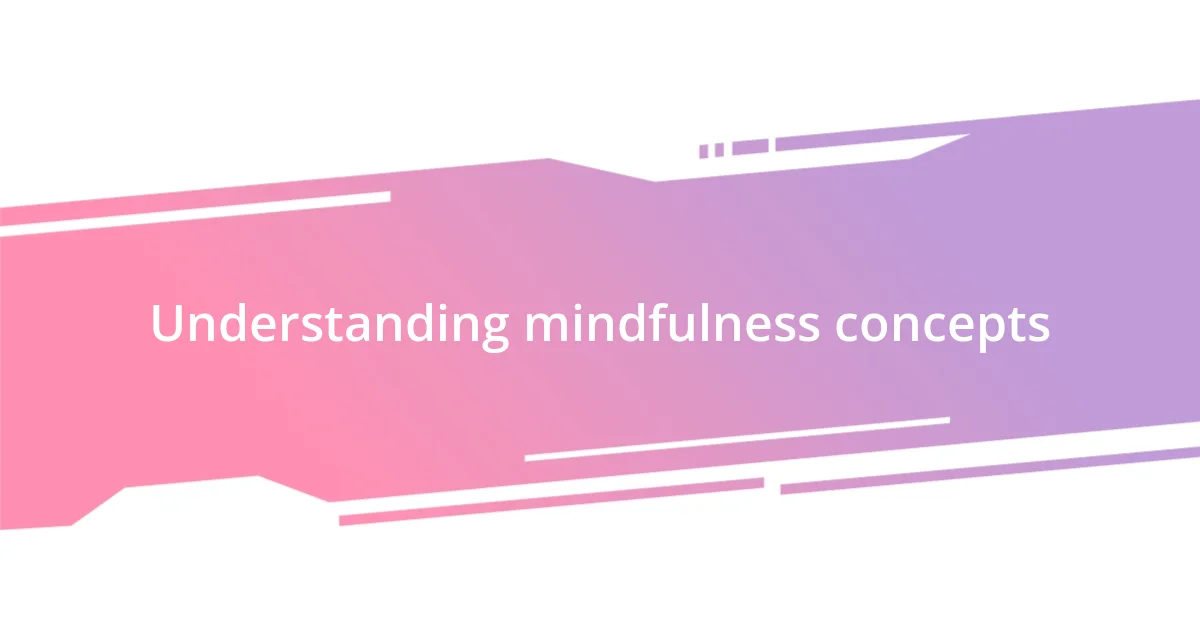
Understanding mindfulness concepts
Mindfulness is fundamentally about being present in the moment, but its layers go deeper than that. I remember a time when my mind was a constant whirlwind; my thoughts raced faster than I could keep up with. It was only when I began practicing mindfulness that I realized how much beauty there is in simply observing my surroundings without the need to judge or react.
One key concept is non-judgment. Initially, the idea of simply acknowledging my thoughts without labeling them as “good” or “bad” felt foreign. But over time, I found that this practice released a weight I didn’t even realize I was carrying. Have you ever caught yourself spiraling just because of a stray thought? Learning to observe those thoughts as passing clouds rather than storms changed my perspective entirely.
Another important aspect is the breath, which serves as an anchor in mindfulness practice. Focusing on my breath not only calmed my nervous system but also brought a sense of clarity. I can vividly recall a particularly stressful day when I felt overwhelmed. By taking a few minutes to breathe deeply, I transformed my anxiety into a sense of calm and control. Isn’t it fascinating how something as simple as our breath can ground us in moments of chaos?
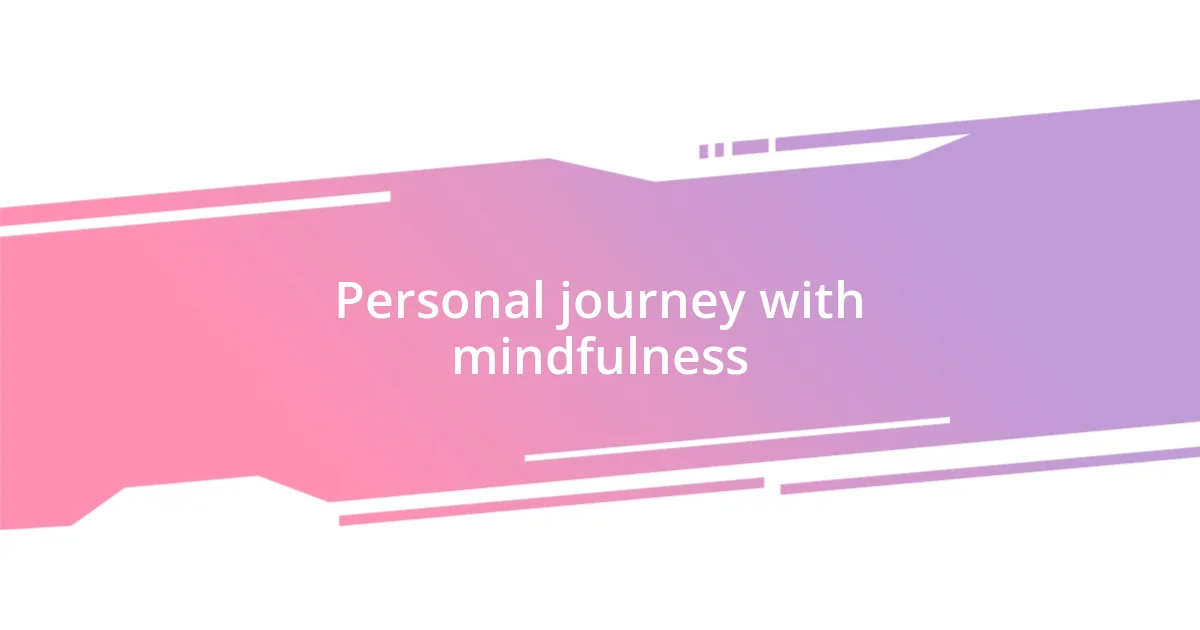
Personal journey with mindfulness
My journey with mindfulness began during a particularly chaotic period in my life. I felt like I was constantly sprinting, but never actually getting anywhere. One day, I stumbled upon a guided meditation app on my phone, and curiosity led me to try it out. After just a few minutes of focusing on my breath, I experienced a profound sense of stillness. That moment was a game changer for me—suddenly, I realized that I could pause the relentless thoughts swirling in my mind and find peace within.
Reflecting on my growth, I’ve compiled some key insights gained from my mindfulness practice:
- Awareness: I learned to become aware of my thoughts and emotions without judgment, allowing me to respond mindfully.
- Patience: Incorporating mindfulness taught me that it’s okay to take things slow, embracing the moment rather than rushing through life.
- Gratitude: I began recognizing small joys in everyday life, from a hot cup of coffee to the warmth of the sun on my face.
- Resilience: Mindfulness helped me build emotional resilience, enabling me to cope with challenges more effectively.
- Connection: As I became more present, I forged deeper connections with the people around me, appreciating each interaction.
This practice has truly transformed my perspective, bringing me closer to myself and the world around me.
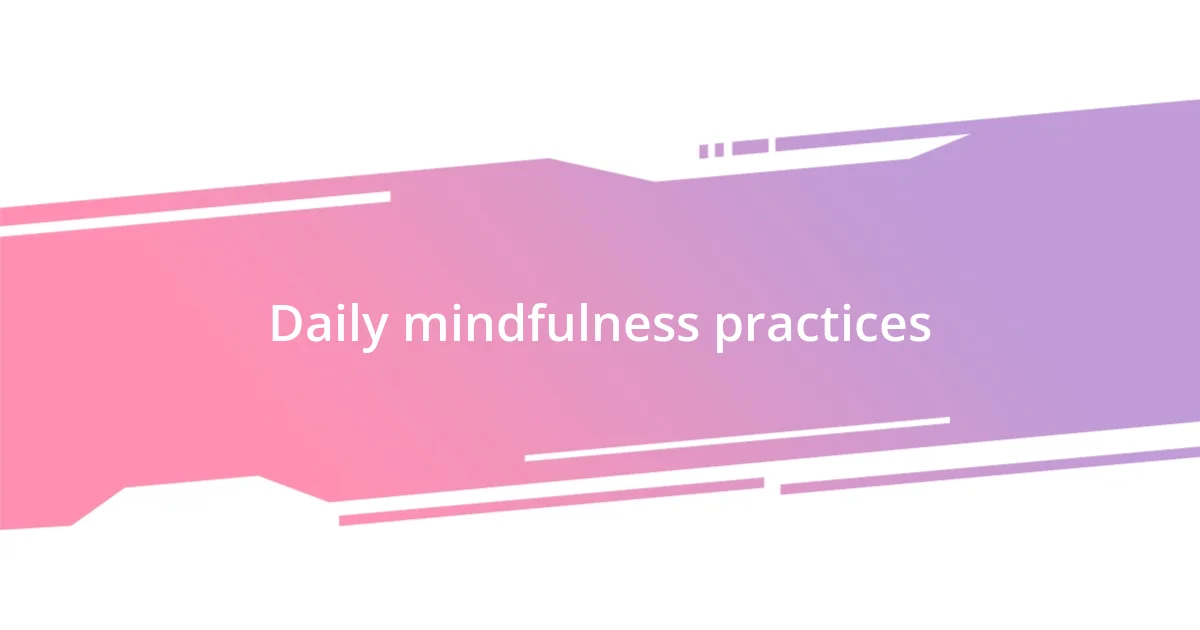
Daily mindfulness practices
Daily mindfulness practices can take many forms, each offering unique benefits. For me, starting my mornings with a short meditation has been monumental. I often find a quiet corner, close my eyes, and focus on my breath for just ten minutes. This simple routine sets a peaceful tone for my day, giving me clarity and a sense of purpose as I move forward.
Another practice I cherish is mindful walking. Whenever I feel stuck in my thoughts, I step outside, taking deliberate and slow steps. With each footfall, I become acutely aware of the sensations around me—the rustle of leaves, the sound of distant laughter, or the warmth of the sun. It reminds me of a time when I experienced stress, and that simple stroll transformed my anxiety into appreciation for the moment. The world feels different when we pay attention, don’t you think?
I also integrate gratitude practices into my daily life. Each evening, I jot down three things I’m thankful for. This brief ritual doesn’t just encourage reflection; it shifts my focus away from what’s lacking to what’s abundant. I recall a particularly tough week when I struggled to find joy; listing my small blessings revealed a wellspring of positivity I hadn’t noticed before. These little practices are more than just habits; they help me embrace life with a fuller heart.
| Practice | Description |
|---|---|
| Meditation | Starting each day with guided breathing exercises to cultivate calm and focus. |
| Mindful Walking | Engaging fully with my surroundings during short walks to re-center and find joy in nature. |
| Gratitude Journaling | Writing down three things I’m grateful for each evening to shift my perspective. |
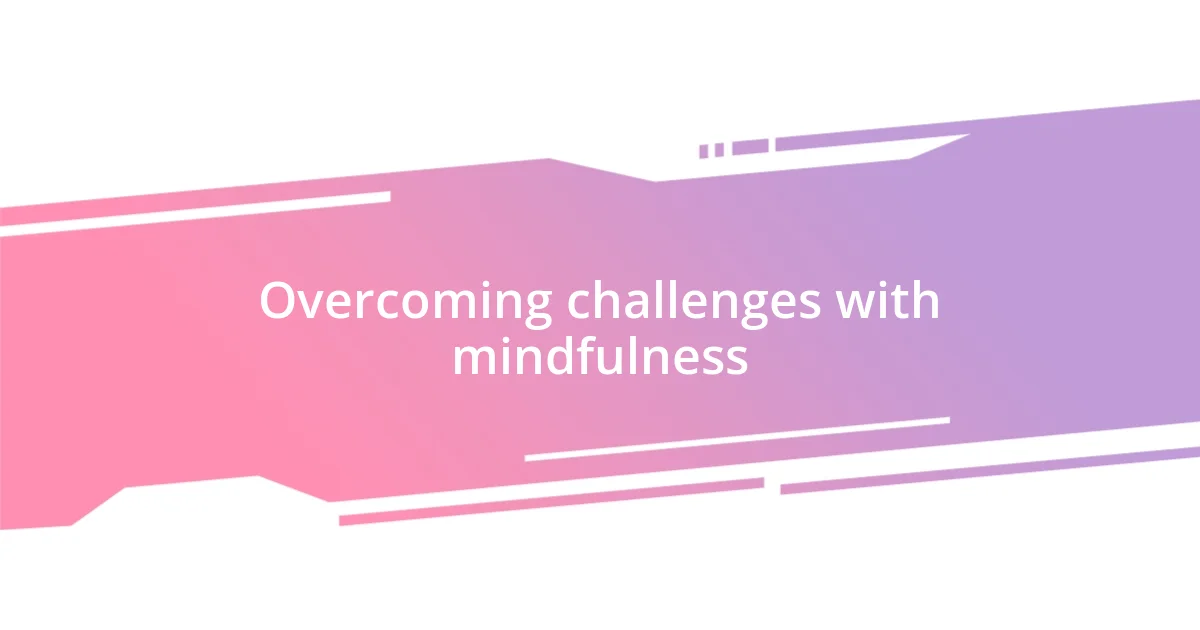
Overcoming challenges with mindfulness
When facing challenges, I often turned to mindfulness as my anchor. I remember one particularly overwhelming week where everything seemed to pile up—work deadlines, personal issues, and the weight of expectations felt unbearable. In those moments, practicing mindfulness helped me acknowledge my stress without becoming consumed by it. Instead of spiraling into worry, I took a step back, focusing on my breath as a means to navigate through the storm. It’s amazing how just a few minutes of intentional breathing can transform a chaotic mindset into one of clarity.
Another instance that stands out was during a tough conversation with a close friend. My instinct was to react defensively, but mindfulness prompted me to pause. By taking a deep breath and grounding myself, I shifted from a place of reaction to one of understanding. This shift not only salvaged our friendship but strengthened it. Have you ever noticed how a mindful moment can change the course of an interaction? It’s remarkable to realize that with just a bit of awareness, we can transform potential conflicts into opportunities for deeper connection.
I’ve also found that mindfulness fosters resilience in the face of obstacles. When I encounter setbacks—be it a missed goal or a personal disappointment—I consciously take a moment to process my feelings instead of rushing to judgement. I picture myself as a sturdy tree, bending but not breaking. This perspective allows me to view challenges as stepping stones rather than stumbling blocks, ultimately fostering a mindset of growth. It’s like turning a setback into a setup for something greater. How do you approach your challenges? Taking a mindful stance can lead to newfound strength and insights you might not have expected.
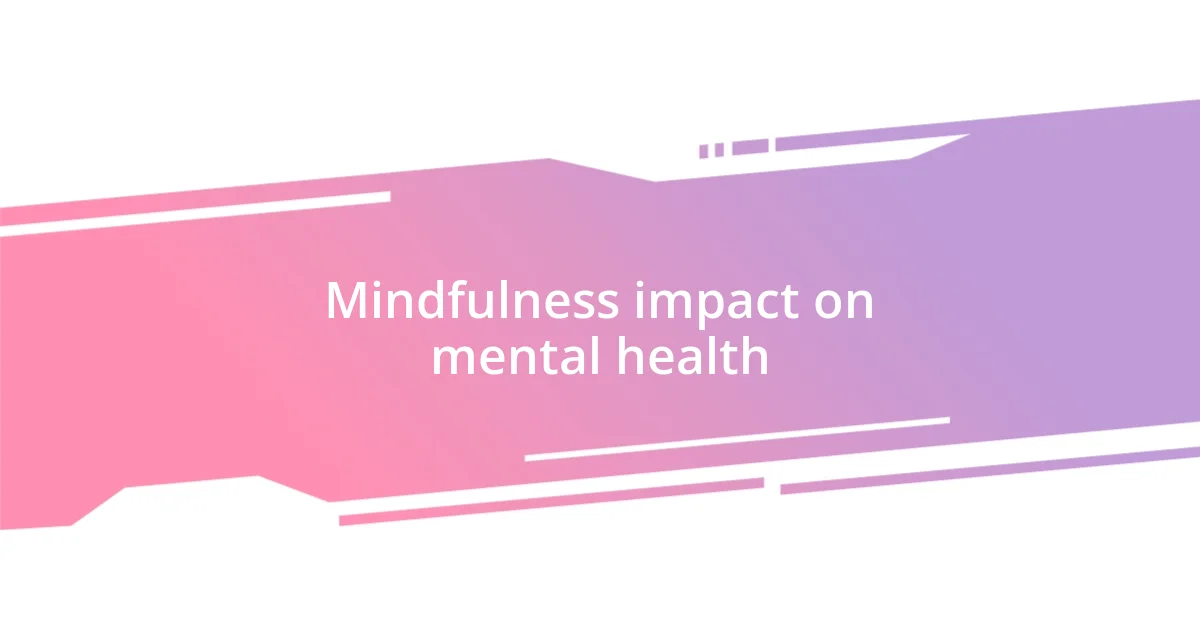
Mindfulness impact on mental health
Mindfulness has had a profound impact on my mental health. I recall a time when anxiety felt like the weight of the world pressing down on me. Engaging in simple mindfulness exercises like deep breathing shifted my perspective from being lost in overwhelming thoughts to recognizing them as just passing clouds. Have you ever paused to notice how powerful just a few minutes of focused breathing can be? It’s remarkable how it turns down the volume on anxiety.
I often notice how mindfulness can create a buffer against negative emotions. One morning, after a rough night filled with restless thoughts, I dedicated time to a mindful visualization. As I pictured my worries dissolving into the air, I felt an unexpected lightness. It was as though I was shedding a heavy coat that no longer served me. Have you ever experienced a moment where you felt lighter just by changing your mental focus? That’s what mindfulness can do—it allows us to release what no longer serves us.
Moreover, I believe that mindfulness nurtures self-compassion, which is incredibly essential for mental wellness. There was a period when I was particularly hard on myself for not meeting certain expectations. Through mindfulness practices, I learned to treat myself with kindness during those times of struggle. Instead of berating myself, I engaged in self-affirming thoughts and gently acknowledged my feelings. It’s profound how this shift in self-talk can lead to a more compassionate view of ourselves. How often do we tend to overlook our own needs amidst the chaos of life? Embracing mindfulness not only enhances mental clarity but also fosters a kinder relationship with ourselves.
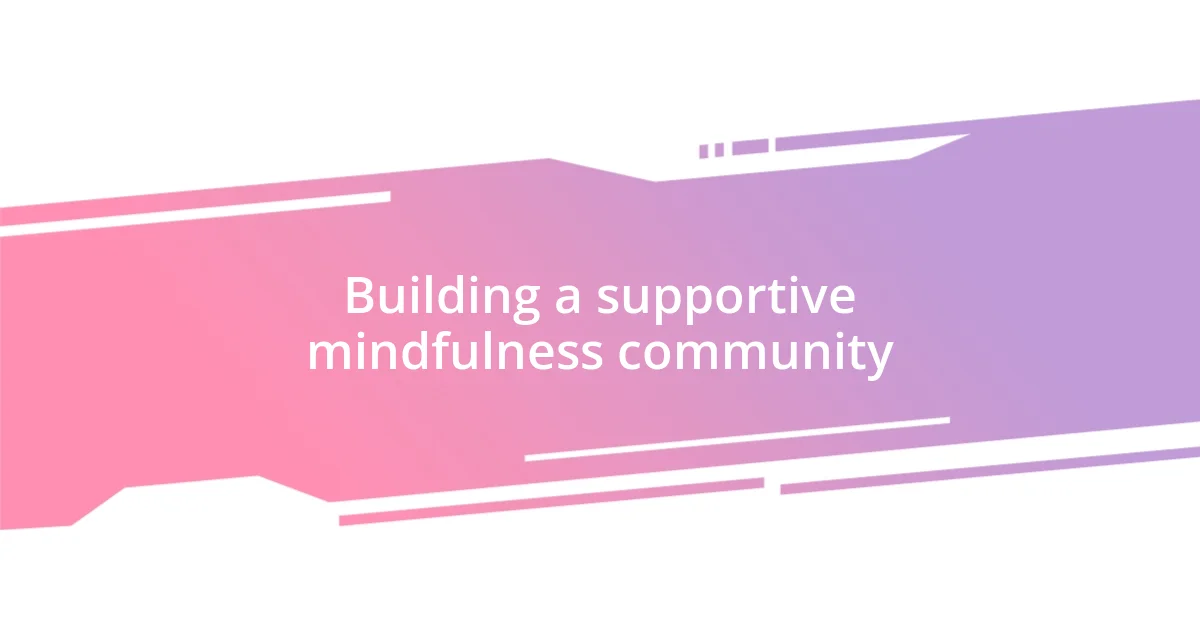
Building a supportive mindfulness community
Building a supportive mindfulness community has been a game-changer for me. When I first started my mindfulness journey, I often felt isolated, unsure if I was truly making progress. Then, I connected with a local group that met weekly to practice together. It was comforting to share my experiences and realize that others faced similar struggles. Have you ever felt that sense of belonging within a community? It’s incredibly validating.
What I’ve come to appreciate is the diversity of perspectives within a mindfulness community. Each person brings their unique insights and practices, which can inspire new techniques and approaches. I remember a session where someone introduced us to a guided meditation that emphasized self-forgiveness. It resonated so deeply with me because I had been grappling with letting go of past mistakes. Sharing these moments of vulnerability cultivates trust and fosters deeper connections, don’t you think?
I’ve also found that building this community extends beyond just our practice sessions. We often share resources, book recommendations, and even support each other during tough times. Just last month, a friend from the group reached out during a particularly challenging week to share a mindfulness app that helped her calm her racing thoughts. That kind of support is invaluable. How much easier would it be if we all had a safety net of like-minded individuals to lean on? It’s heartening to know that I’m not alone on this path and that we can lift each other up through mindfulness.
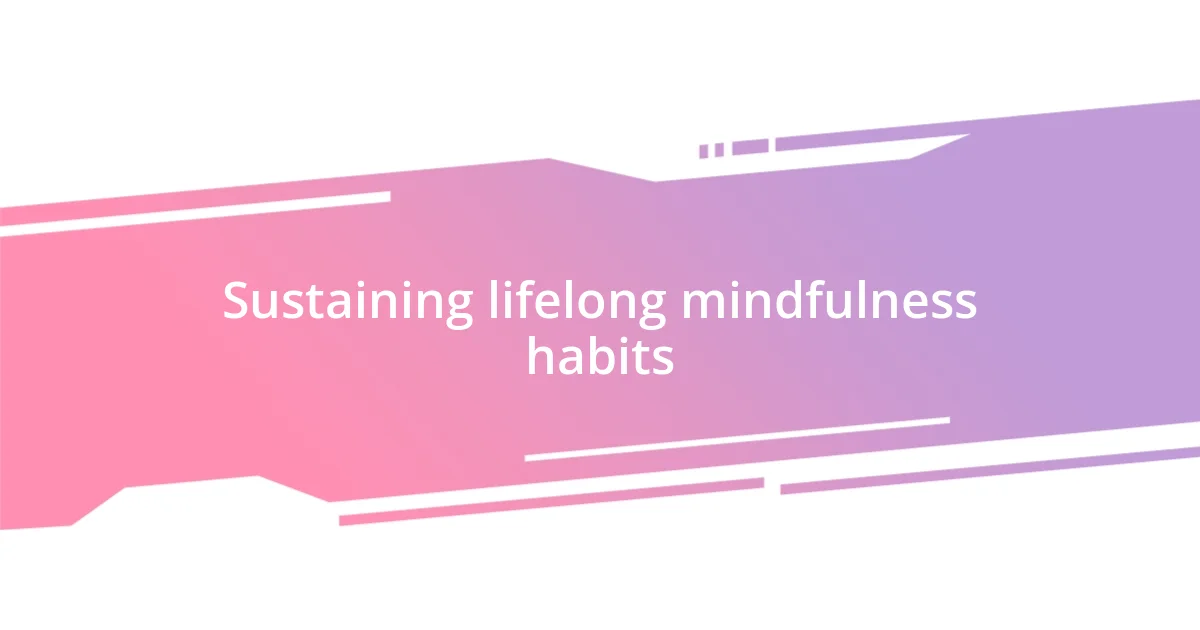
Sustaining lifelong mindfulness habits
Sustaining lifelong mindfulness habits requires intentionality and practice. One approach I’ve found effective is setting aside dedicated time daily, even if it’s just ten minutes. Those moments, whether spent in silence or guided meditation, create a grounding rhythm in my busy life. Have you noticed how carving out even a little time for yourself can shift your entire day’s energy?
I’ve also discovered the power of integrating mindfulness into everyday activities. For instance, when washing dishes, I shift my focus to the sensations—the warmth of the water, the texture of the soap, the repetitive motion—transforming a mundane chore into a mindful practice. I often ask myself, “What does this moment feel like?” This practice not only deepens my awareness but also helps me remain present throughout the day. How often do we let daily tasks slip by in a blur, instead of soaking in the simplicity of the moment?
Accountability plays a crucial role in maintaining mindfulness habits as well. I’ve teamed up with a friend to check in with each other weekly about our practices. Sharing our experiences not only boosts my motivation but also enriches my understanding of mindfulness. It’s like having a running buddy but for the mind! Have you considered how connection could enhance your journey? The journey feels less daunting when we hold each other accountable, reinforcing our commitment to a more mindful life.












